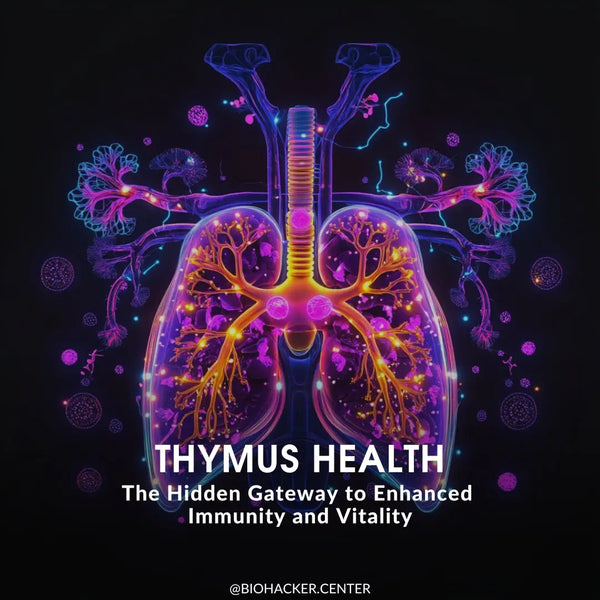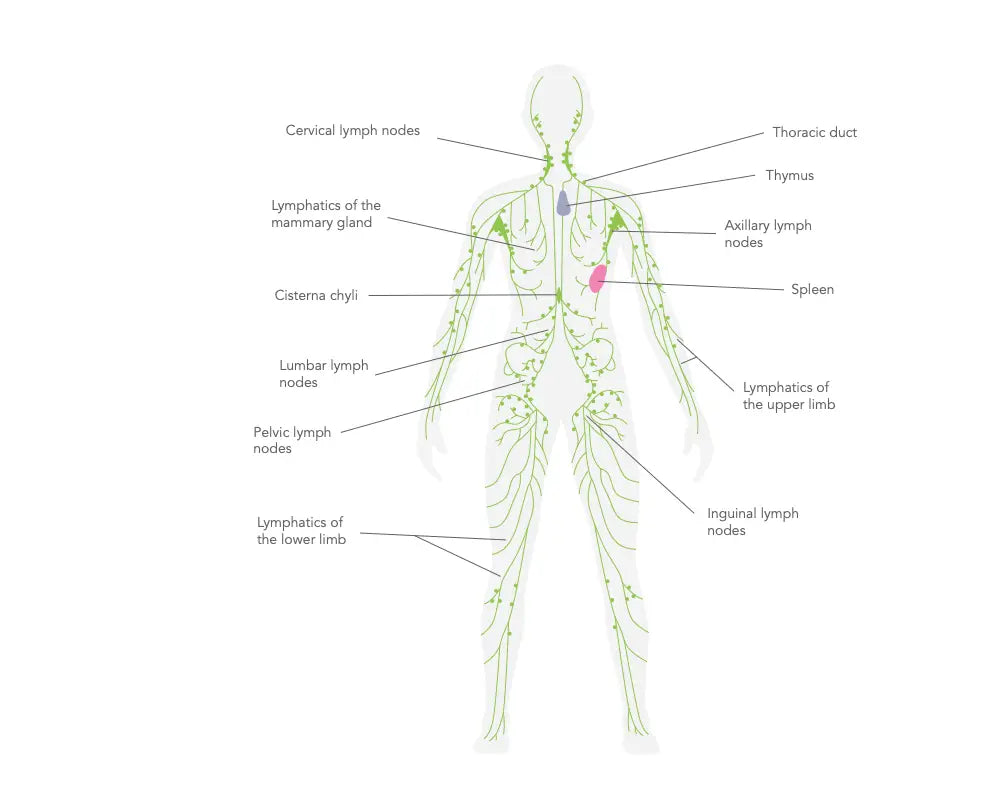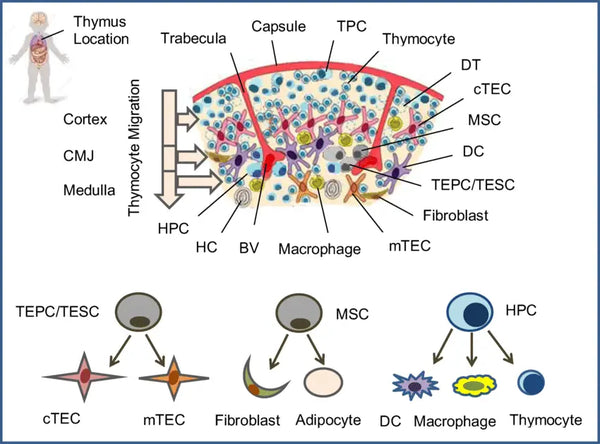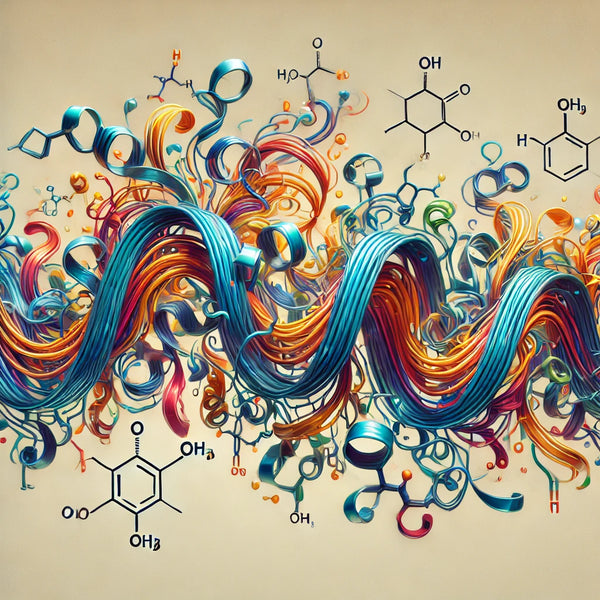
This article explores the hidden significance of the thymus gland and examines evidence-based strategies to optimize its function for improved immunity and well-being.
Introduction
The thymus is a distinctive primary lymphoid organ of the immune system. It is found in the anterior superior mediastinum, posterior to the sternum and between the lungs. The thymus is a lobular gland comprising two separate yet interconnected lobes. Every lobe is encased and subdivided into a significant number of smaller lobules. The lobules comprise a cortex full of developing T cells and a medulla with mature T cells.(1)

In embryogenesis, the thymus forms from the third pharyngeal pouches. It increases until puberty is reached and then starts an involution during life. This involution is characterized by the shrinking and replacement of thymic tissue with adipose tissue, which causes the thymus to lose its function with age.
The central role of the thymus is the synthesis and maturation of T lymphocytes. Thymocytes, immature T cells, are born from hematopoietic stem cells in the bone marrow and relocate to the thymus. Here, they are submitted to a very tough selection. The selection process allows only a tiny fraction of thymocytes to survive, guaranteeing that only T cells with appropriate self-MHC restriction and self-tolerance are released into circulation.(2)

Image: Human thymus cell architechture.
Source: Shichkin, V. P., & Antica, M. (2020). Thymus regeneration and future challenges. Stem cell reviews and reports, 16(2), 239-250.
Research using animal models has shown that a variety of peptide and non-peptide hormones have multifaceted roles in the thymus, influencing the growth, development, movement and programmed cell death (apoptosis) of thymocytes as they mature. For instance, hormones like growth hormone and prolactin are known to boost the growth and movement of thymocytes, while glucocorticoids tend to trigger apoptosis in these cells.(3)
Thymus Hormones and Their Effects on the Body
The thymus also secretes several hormones, such as thymosin, thymopoietin, and thymulin. These hormones initiate T-cell differentiation and maturation. Thymosin, especially, was proven to activate the formation of T cells in other lymphoid organs.
Thymosins
A group of thymosin hormones, thymosin alpha-1 in particular, is essential in the maturation of T lymphocytes.(4) Thymosin alpha-1 improves the activities of particular immune cells, such as dendritic and natural killer cells. It also influences the differentiation of T cells and covers a broader range than just the thymus and its activities involving T cells in peripheral tissues and other lymphoid organs. The potential of thymosin as a therapeutic agent has been studied extensively, particularly in treating chronic infections in immunocompromised states and as an immunostimulatory agent in cancer therapy.(5-6)
Thymopoietin
Thymopoietin influences T cell differentiation and the T cell selection process, thus allowing the developed T cells to appropriately respond to pathogens without attacking the body's tissues. Thymopoietin helps develop central immune tolerance, one of the critical processes of autoimmunity prevention. Furthermore, thymopoietin also controls neuromuscular transmission.(7-9)
Thymulin
Thymulin is a nonapeptide (an oligopeptide comprised of nine amino acid residues) hormone secreted by thymic epithelial cells. It is active only when bound to zinc: Thymulin affects the development and activity of T cells and other immune cell types. The function of thymulin is essential in the modulation of the immune response, especially in maintaining the balance between various types of immune cells. In addition, thymulin levels reduce in old age, correlating with age-related changes in the immune system – it can, therefore, be used as a therapeutic agent in immune disorders.(10-11)

Image: An artistic view of thymic peptides.
Improving the Function of the Thymus
Enhancing the function of the thymus, particularly in old age, is critical because the thymus is a crucial organ in regulating the immune system. No specific methods are universally accepted for improving thymic function; however, several approaches may be helpful.
Nutritional Supplements and Diet
Some nutrients and supplements have been proposed to aid the health of the thymus. For example, zinc and vitamin D are vital in the immune system and support thymic function.(12) Numerous vitamin D receptors (VDR) are found in monocytes, macrophages, and thymus tissue, which marks a specific role of vitamin D and its metabolites in the immune system.(13)
Exercise
Regular physical exercise has been linked to a healthy immune system. Moderate and high-level activities support the condition of the thymus by reducing stress and improving the body as a whole.(14) However, too high and constant levels of physical exercise are associated with increased biomarkers linked with an aging immune system, which are partially reduced with physiological aging.(15)
Stress Reduction
Chronic stress may damage the immune system, including the thymus.(16) Increased levels of glucocorticoids (e.g., cortisol) may cause thymocyte apoptosis.(17) Stress reduction methods, including meditation, yoga, mindfulness, and many others discussed in the Resilient Being book, might indirectly help the thymus function better.
Hormonal Treatments
Some studies have looked into the potential of utilizing growth hormones, sex steroids and thymic hormones to restore thymic function, particularly in old age or people with immunocompromise. Studies have shown that growth hormone (GH), ghrelin (GRL) and insulin-like growth factor 1 (IGF-1) can stimulate thymus regeneration. In some animal models, administration of GH or IGF-1 led to increased thymic mass and enhanced production of T cells. Clinical trials in humans have shown promising results in using GH for thymic regeneration.(18-20)
Avoiding Harmful Substances
Smoking and drinking too much alcohol may worsen the immune response and thus be detrimental to the thymus. Chronic exposure to pesticides, heavy metals like lead and mercury, benzene and other industrial chemicals, long-term use of immunosuppressive medications or corticosteroids, air pollutants such as fine particulate matter (PM2.5), and recreational drugs can all impair thymus function.(21-23)
Immunotherapy
Advanced therapies such as cytokines or thymic peptides are under investigation for improving thymic function, particularly for diseases like HIV/AIDS and some cancers. Examples of these therapies include keratinocyte growth factor (KGF), interleukin-22, RANKL, epidermal growth factor (EGF), BMP4 and IL-7.(24)
Sleep Quality
Sleep is vital in maintaining a healthy immune system; its quality directly influences thymic function. The thymus is responsible for producing T-cells, which are crucial for adaptive immunity, and its activity is closely linked to the body's circadian rhythms. Poor sleep quality, irregular sleep patterns, or insufficient sleep can disrupt these rhythms, leading to decreased T-cell production and impaired immune responses.(25)
During deep sleep, the body undergoes restorative processes, including releasing growth hormones and regulating inflammatory markers, supporting thymic health. Conversely, chronic sleep deprivation can elevate cortisol levels, suppressing thymus activity and accelerating its involution.(26)
Peptides and the Thymus: A Future Potential for Immune System Health?
Thymic peptides, especially, have gotten much attention because of their possible value in helping the thymus and the immune system function well. Peptides are either naturally occurring or synthetic biological agents used to modulate the activity of the thymus. The most researched synthetic thymic peptides are the following:
Thymosin Alpha-1
The most studied thymic peptide. Thymosin Alpha-1 (Tα1) has been found to improve T-cell function and has been used in several clinical settings, such as treating chronic viral infections, some cancers, and immune deficiencies. It involves altering the immune response, improving T-cell maturation, and stimulating cytokine production.(27-28) Generally, Tα1 can bind to TLR3/4/9 and activate downstream IRF3 and NF-κB signal pathways, thus promoting the proliferation and activation of target immune cells. Moreover, TLR2 and TLR7 (toll-like receptors 2 and 7) are also associated with Tα1, enhancing innate and adaptive immune responses.(29)
Thymosin Beta-4 (TB-500)
Thymosin Beta-4 (Tβ4) or TB-500 is a synthetic peptide used today due to its crucial role in tissue healing, regeneration and cellular reparative. It was researched for its ability to accelerate the process of wound healing, decrease inflammation and offer cardiovascular protection, especially after myocardial infarction.(30)
Tβ4 has various biological activities, such as inhibiting inflammation and apoptosis and promoting proliferation and angiogenesis. Moreover, animal experiments and clinical studies have reported that Tβ4 exerts therapeutic effects on several diseases or injuries, such as myocardial infarction and ischemia-reperfusion injury, liver and renal fibrosis, ulcerative colitis, colon cancer and skin trauma.(31)
However, its use in humans is experimental and not FDA-approved, and most studies are conducted in animals.

Image: An artistic interpretation of TB-500.
Synthetic Thymulin Analogs
Synthetic analogs of thymulin have been researched to improve its stability and biological activity. These analogs are created to imitate the immune-modulating action of the natural thymulin, primarily in T-lymphocytes function and anti-inflammatory effect.(32)
Conclusion
The thymus gland plays a vital role in immune system regulation, mainly through T-cell development and maturation. It naturally shrinks and becomes less active with age, but practical ways exist to keep it functioning at its best. An anti-inflammatory diet, regular exercise, high-quality sleep, and reducing stress are simple, everyday actions supporting thymic health. Thymic peptides, hormone therapies and immunotherapy offer intriguing possibilities for boosting thymus regeneration and immunity. By taking care of the thymus, you can promote better overall health and resilience.
Scientific references:
- Haynes, B. & Markert, M. & Sempowski, G. & Patel, D. & Hale, L. (2000). The role of the thymus in immune reconstitution in aging, bone marrow transplantation, and HIV-1 infection. Annual Review of Immunology 18 (1): 529–560.
- Adkins, B. et al. (1987). Early events in T-cell maturation. Annual Review of Immunology 5 (1): 325–365.
- Savino, W. & Mendes-da-Cruz, D. & Lepletier, A. & Dardenne, M. (2016). Hormonal control of T-cell development in health and disease. Nature Reviews Endocrinology 12 (2): 77–89.
- Goldstein, A. et al. (1977). Thymosin alpha1: isolation and sequence analysis of an immunologically active thymic polypeptide. Proceedings of the National Academy of Sciences 74 (2): 725–729.
- Costantini, C. et al. (2019). A reappraisal of thymosin alpha1 in cancer therapy. Frontiers in Oncology 9: 873.
- Dominari, A. et al. (2020). Thymosin alpha 1: a comprehensive review of the literature. World Journal of Virology 9 (5): 67–78.
- Harris, C. et al. (1994). Three distinct human thymopoietins are derived from alternatively spliced mRNAs. Proceedings of the National Academy of Sciences 91 (14): 6283–6287.
- Hogquist, K. & Baldwin, T. & Jameson, S. (2005). Central tolerance: learning self-control in the thymus. Nature Reviews Immunology 5 (10): 772–782.
- Audhya, T. & Scheid, M. & Goldstein, G. (1984). Contrasting biological activities of thymopoietin and splenin, two closely related polypeptide products of thymus and spleen. Proceedings of the National Academy of Sciences 81 (9): 2847–2849.
- Dardenne, M. & Savino, W. & Berrih, S. & Bach, J. (1985). A zinc-dependent epitope on the molecule of thymulin, a thymic hormone. Proceedings of the National Academy of Sciences 82 (20): 7035–7038.
- Taub, D. & Longo, D. (2005). Insights into thymic aging and regeneration. Immunological Reviews 205 (1): 72–93
- Dardenne, M. (2002). Zinc and immune function. European Journal of Clinical Nutrition 56 (3): S20–S23.
- Maggini, S. & Wintergerst, E. & Beveridge, S. & Hornig, D. (2007). Selected vitamins and trace elements support immune function by strengthening epithelial barriers and cellular and humoral immune responses. British Journal of Nutrition 98 (S1): S29–S35
- Duggal, N. & Pollock, R. & Lazarus, N. & Harridge, S. & Lord, J. (2018). Major features of immunesenescence, including reduced thymic output, are ameliorated by high levels of physical activity in adulthood. Aging Cell 17 (2): e12750.
- Moro-García, M. et al. (2014). Frequent participation in high volume exercise throughout life is associated with a more differentiated adaptive immune response. Brain, Behavior and Immunity 39: 61–74.
- Domínguez-Gerpe, L. & Rey-Méndez, M. (1997). Time-course of the murine lymphoid tissue involution during and following stressor exposure. Life Sciences 61 (10): 1019–1027.
- Jondal, M. & Pazirandeh, A. & Okret, S. (2004). Different roles for glucocorticoids in thymocyte homeostasis? TRENDS in Immunology 25 (11): 595–600.
- Savino, W. & Dardenne, M. (2010). Pleiotropic modulation of thymic functions by growth hormone: from physiology to therapy. Current Opinion in Pharmacology 10 (4): 434–442.
- Chu, Y. et al. (2008). Exogenous insulin-like growth factor 1 enhances thymopoiesis predominantly through thymic epithelial cell expansion. Blood 112 (7): 2836–2846.
- Taub, D. & Murphy, W. & Longo, D. (2010). Rejuvenation of the aging thymus: growth hormone-mediated and ghrelin-mediated signaling pathways. Current Opinion in Pharmacology 10 (4): 408–424.
- Shiels, M. et al. (2014). Cigarette smoking and variations in systemic immune and inflammation markers. Journal of the National Cancer Institute 106 (11): dju294.
- Han, Y. & Lin, T. L. & Pruett, S. (1993). Thymic atrophy caused by ethanol in a mouse model for binge drinking: involvement of endogenous glucocorticoids. Toxicology and Applied Pharmacology 123 (1): 16–25.
- Ustarroz-Cano, M., López-Ángel, M., López-Valdez, N., García-Peláez, I., & Fortoul, T. I. (2019). The Effect of Atmospheric Pollution on the Thymus. In Thymus. IntechOpen.
- Duah, M. & Li, L. & Shen, J. & Lan, Q. & Pan, B. & Xu, K. (2021). Thymus degeneration and regeneration. Frontiers in Immunology 12: 706244.
- Besedovsky, L. & Lange, T. & Haack, M. (2019). The Sleep-Immune Crosstalk in Health and Disease. Physiological Reviews 99 (3): 1325–1380.
- Irwin, M. R., Olmstead, R., & Carroll, J. E. (2016). Sleep disturbance, sleep duration, and inflammation: a systematic review and meta-analysis of cohort studies and experimental sleep deprivation. Biological psychiatry, 80(1), 40-52.
- Romani, L. et al. (2007). Thymosin α1: an endogenous regulator of inflammation, immunity, and tolerance. Annals of the New York Academy of Sciences 1112 (1): 326–338.
- Romani, L. et al. (2012). Jack of all trades: thymosin α1 and its pleiotropy. Annals of the New York Academy of Sciences 1269 (1): 1-6.
- Tao, N. et al. (2023). Thymosin α1 and Its Role in Viral Infectious Diseases: The Mechanism and Clinical Application. Molecules 28 (8): 3539.
- Maar, K. et al. (2021). Utilizing Developmentally Essential Secreted Peptides Such as Thymosin Beta-4 to Remind the Adult Organs of Their Embryonic State—New Directions in Anti-Aging Regenerative Therapies. Cells 10 (6): 1343.
- Xing, Y. & Ye, Y. & Zuo, H. & Li, Y. (2021). Progress on the Function and Application of Thymosin β4. Frontiers in Endocrinology 12: 767785.
- Lunin, S. & Khrenov, M. & Novoselova, T. & Parfenyuk, S. & Novoselova, E. (2008). Thymulin, a thymic peptide, prevents the overproduction of pro-inflammatory cytokines and heat shock protein Hsp70 in inflammation-bearing mice. Immunological Investigations 37 (8): 858–870.





